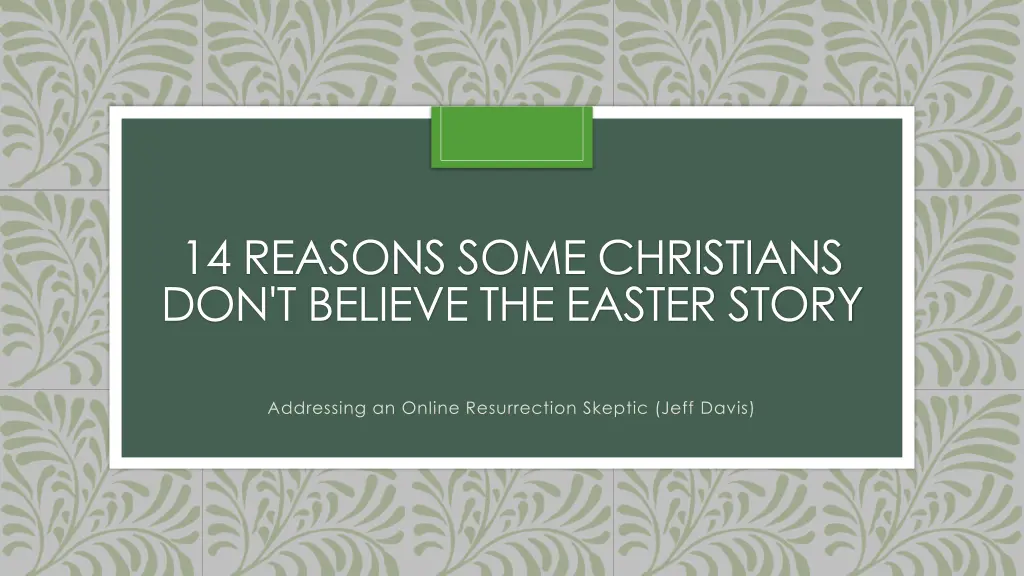
Challenging Easter Story Misconceptions with Historical Insights
Explore reasons why some Christians doubt the Easter story, addressing common skeptic arguments like inconsistencies in Gospel accounts, Mark's lack of resurrection mention, and misconceptions about Jewish beliefs in bodily resurrection. Learn how scholars offer historical contexts and interpretations to reconcile these issues.
Uploaded on | 1 Views
Download Presentation

Please find below an Image/Link to download the presentation.
The content on the website is provided AS IS for your information and personal use only. It may not be sold, licensed, or shared on other websites without obtaining consent from the author. If you encounter any issues during the download, it is possible that the publisher has removed the file from their server.
You are allowed to download the files provided on this website for personal or commercial use, subject to the condition that they are used lawfully. All files are the property of their respective owners.
The content on the website is provided AS IS for your information and personal use only. It may not be sold, licensed, or shared on other websites without obtaining consent from the author.
E N D
Presentation Transcript
14 REASONS SOME CHRISTIANS DON'T BELIEVE THE EASTER STORY Addressing an Online Resurrection Skeptic (Jeff Davis)
1. The Gospels Rez Accounts are Inconsistent. The Resurrection Skeptic: If you read the four Gospels side by side, you ll notice some pretty glaring inconsistencies in the resurrection story. How many women went to the tomb? What did they see when they got there? Who did Jesus appear to first? The details vary depending on which Gospel you re reading, and that s enough to raise some eyebrows among skeptical Christians . Responses: 1. Minimal Facts Approach (Dr. Gary Habermas)- Even if there are contradictions I nthe Gospel Rez accounts, this is totally irrelevant to the hypothesis Jesus Rose from the dead from a secular historical perspective (or even the hypothesis that God rose Jesus from the dead). In fact, such cases Instead, such contradictions are perhaps only relevant to the hypothesis Christianity is true (whereby Bible is sufficiently attached) = https://www.youtube.com/watch?v=lF6nR6wKcUw 2. Literal Harmonization (Dr. Lydia McGrew)- The accounts are reconcilable as we have Mary Magdalene and the other Mary; we have those two plus Salome; we have those two plus Joanna and unnamed "others"; we have Mary Magdalene, though obviously not alone (v. 2, "we" do not know...) No one list excludes any other; none speaks of these being the only persons to travel to the tomb. = https://www.tektonics.org/qt/rezrvw.php 3. Ancient Literary Devices (Dr. Mike Licona)- The Gospel writers employed various ancient literary devices such as spotlighting and such explain away these apparent contradiction = https://www.youtube.com/watch?v=ewwOpVGS7yE ; & longer form https://www.youtube.com/watch?v=ZzggLq-fNHU .
2. The earliest Gospel (Mark) Doesnt Mention the Resurrection. The Resurrection Skeptic: The Gospel of Mark is widely considered to be the earliest of the four Gospels, according to PBS, and guess what? It doesn t even mention the resurrection. The original ending of Mark s Gospel has Jesus being buried and the women finding an empty tomb, but no post-resurrection appearances Response: So many commentaries contain mistakes and inaccuracies about Mark 16:9-20 that it would require several blog-posts to review and correct them all. Influential Biblical scholar Dr. N. T. Wright responds thusly; Two of the earliest manuscripts contain anomalous features that indicate that their copyists were aware of copies that included verses 9-20 which explicitly speaks of Resurrection Regardless, verse 6 says Jesus rose from the dead and implies the truth of the later Resurrection appearances [ Don t be alarmed, he said. You are looking for Jesus the Nazarene, who was crucified. He has risen! He is not here. See the place where they laid him. 7 But go, tell his disciples and Peter, He is going ahead of you into Galilee. There you will see him, just as he told you.] .
3. The idea of bodily resurrection was not a Jewish belief What rubbish, the idea of a Bodily Resurrection was uniquely a Jewish belief during the time of Jesus. We have absolute proof on this front and Dr. N.T. Wright has conclusively proven this beyond all reasonable doubt in his massive 700 page book on Jesus Resurrection whereby he proves, conclusively, from every Jewish text dating form 200 BC to 200 A.D., that the only notion of Resurrection that Jews had at this time was a bodily one. Learn your facts before you speak skeptic!!!
4. The empty tomb doesnt necessarily prove a resurrection. Just because Jesus tomb was found empty doesn t necessarily mean he was resurrected. There could be other explanations, like grave robbers or even Jesus followers moving the body themselves. The empty tomb is a mystery, but it s not a slam- dunk for the resurrection. Response: Agreed. No one ever claimed the Empty Tomb alone was sufficient to prove Jesus rose from the dead, but it is a necessary evidential component, if the body were to be proven to still lay in the tomb, then this would falsify the bodily Resurrection of Jesus.
5. The post-resurrection appearances could have been hallucinations. Some skeptical Christians argue that the post-resurrection appearances of Jesus could have been hallucinations or visions experienced by his grieving followers. Grief can do strange things to the mind, and it s not uncommon for people to see or hear things that aren t really there after a traumatic loss. Response: Christians don t believe the Rez appearances were hallucinations (a subjective experience with no real world correlate). Dale Allison believes in objective vision of a spiritual Jesus akin to a Post-Death Communication, but psychologically supernatural visions are radically different from natural hallucinations. Learn the medical facts skeptic!!! Coulda, woulda, shoulda skeptic! Sure it is possible that perhaps some of the disciples had hallucinations, but medical experts specializing in hallucinations have proven conclusively that simultaneous multi-modal group hallucinations are physically impossible to occur. There are many other reasons to rule out hallucinations as an explanation such as the fact that the mundane bodily Rez of Jesus was inconsistent with the ingrained social expectations of a glorious Resurrection body that glowed or was more akin to Jesus transfiguration. See Dr. Jospeh Bergeron at 1 hour 9:56 min to 1 hour 16 min mark = https://www.youtube.com/watch?v=iLlTXTI4aVI
6. The resurrection story could have been a later addition This is a joke, right? Jeff Davis here is surely consulting non-Christian Jesus mythicists and other such radical unbelieving conspiracy nutters here, there is no way he is talking to actual Christian who believe this!!! This claim is total provable nonsense, virtually everyone with a PhD in the Society for Biblical Literature knows that the Jesus Resurrection was absolutely essential and central to the formation of the Gospel message. Even Atheists and agnostics scholars like Dr. Bart Ehrman, who denies obvious truths like the empty tomb, is not so radically skeptical and stupid as to deny the fact that Jesus Resurrection was the foundational message of the early church! As Paul says in 1 Corinthians 15:14, And if Christ has not been raised, our preaching is useless and so is your faith .
7. The resurrection story borrows from pagan myths. Oh my Gosh, you are consulting radical godless Jesus Mythicists!!! Look Jeff, time to get educated in the historical scholarship here, no credible Christian or scholar believes this. There are 0 provable examples of a pagan dying and rising god prior to or during the time of Jesus. Don t believe me, let me quote a non-Christian Agnostic and Biblical scholar Dr. Bart Erhman address this foolishness (see 35 seconds mark to 2 min mark = https://www.youtube.com/watch?v=knjAvVOU20s & also more detail refutation by Inspiring Philosophy = https://www.youtube.com/watch?v=4guKjpqoMys
8. The Apostle Paul never met the physical Jesus. Yes he did. You are taking the later story of Acts (written by that Gospel writer Luke who you rejected earlier as making stuff up later on) over and above what Paul says in his own letters. Paul says he saw the risen Jesus in the flesh like the other Apostles, who cares what Luke says in Acts. Next scholars like Craig Keener, having written an extensive 4 volume commentary on Acts, proves that Acts does not deny that Paul saw the bodily Risen Jesus in the flesh during his Damascus road experience, that is an assumption based on other theophany-like elements that accompanied his Resurrection appearance in the flash.
9. The Gospel writers had an agenda. So does everyone who has written or said anything in the history of mankind, that doesn t mean what they wrote or said was false or was to be disbelieved, this is ludicrous thinking! In fact, their emphases and biases can be detected and this helps historians establish the objective facts that they report through the criteria of authenticity when they report details that go against that agenda. Historians use various tools to glean truths from within sources and the Gospels have been proven to be very reliable Greco-Roman biographies and histories in the details they report (including various undesigned coincidences, etc.). No secular historian denies that the Gospels are the very best source we have for the historical Jesus and for first century Judaism in general.
10. The resurrection story is just too far-fetched for some people. Again, Christians who refuse to believe in miracles- yeah are you sure these aren t your Atheist buddies lying to you and pretending to be Christians? The age old anti-supernatural bias and naturalism philosophical systems are self-refuting and have been discredited by more informed thinkers. There is nothing cray about believing in God or His ability to perform supernatural acts; you re just biased!
11. The resurrection isnt essential to the Christian message. Some Christians argue that the physical resurrection of Jesus is not actually essential to the core message of Christianity. They believe that the teachings of Jesus about love, forgiveness, and social justice are what really matter, not whether or not he actually rose from the dead. Response: Paul says differently, as does Jesus Himself. Belief in the Resurrection of Jesus makes the difference between salvation and damnation. Without Jesus atoning death and Resurrection, then we are still in our sins and must pay the penalty of eternal damnation or separation form God as punishment for those sins. The Bible is clear that no amount of good works is sufficient to blot out one s sins.
12. The resurrection story has been used to justify violence Unfortunately, the resurrection story has sometimes been used as a tool of violence and oppression. Some Christians have used it to justify crusades, inquisitions, and other atrocities in the name of a triumphant Christ. Response: Pure, unadulterated historical horse trash skeptic! I ve studied the history of these events and literally 0 historians and scholars blame belief in Jesus death and bodily Resurrection for the Crusades or Inquisitions. There is no logical entailment between Rez belief and violence, in fact, it is quite the opposite since Christians are motivated to follow Christ s commands out of loving devotion for how He suffered on the cross and rose from the dead for them. Jesus directly condemns such acts of political violence on the part of true followers of Christ. These were mainly socially and politically motivated events that had virtually nothing to do with theological doctrine. But under your line of thinking, we might as well blame Islam and belief in Muhammed for the Crusades, since it was Muslims (not Christians) were the ones who started the hostilities against Christians. See Crescent and the Cross starting at the 7:48 min to 11:22 min mark = https://www.youtube.com/watch?v=ezP7Qv_9jl8
13. Science has made it harder to believe in miracles. Scientism is self-refuting and false. Philosophers of science and scientists in the know all laugh at people who think this way, it is the very height of foolishness and arrogance. Science is form oof knowledge that employs a methodology that is helpful in gaining knowledge about the world and universe that we inhabit, it particularly tries to establish certain laws of nature as generalized descriptions of what normally happens in our universe. The laws of nature are descriptive not prescriptive and thus nothing about our knowledge of them or nature precludes or excludes the plausibility of miraculous or supernatural events.
14. Doubt is a normal part of faith. True, but belief and assurance are also normal parts of faith too! Doubts are inevitable in a Fallen sinful world, they are not good in and of themselves, but God expects us to be honest with ourselves, others and Himself and so He wants us to deal with any doubts we have head on with His help. If a Christian does have doubts about the Resurrection, it is good for him to deal with the issue and look into the powerful evidence we have in favour of it. Unlike any other major world religion, Christianity alone is an evidence-based faith that has strong historical and scientific (via the Shroud of Turin) proof that it s claims are in fact true. See Dr. Gary Habermas free book, The Uniqueness of Jesus Christ on his website = https://www.garyhabermas.com/Evidence2/Habermas-Uniqueness-of-Jesus-Christ-2016.pdf God wants us to wrestle and grapple with that evidence as we seek God s truth






















